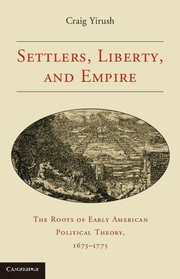1 - English Rights in an Atlantic World
Published online by Cambridge University Press: 05 June 2012
Summary
In Philadelphia in 1687, William Penn printed a small pamphlet entitled The Excellent Priviledge of Liberty and Property Being the Birth-Right of the Free-born Subjects of England. The Excellent Priviledge was an abridgement of a longer tract called English Liberties: Or, the Free-Born Subject's Inheritance published by the radical Whig Henry Care in 1682. Care wanted to provide religious dissenters, then facing the full force of the Test and Corporation Acts, with an accessible guide to English law should they be hauled into court. But Care's primer outlived its dissenting roots to become a publishing phenomenon, with successive editions circulating around the Atlantic world in the eighteenth century, its small size – it could literally fit into a pocket – enabling knowledge of English rights to reach the peripheries of the empire.
Penn had a similar aim for his abridgment of English Liberties, hoping it would aid the settlers in his new colony to understand the laws that were “their native Right and Inheritance.” Penn thought his version would be particularly valuable for those “who may not have leisure from their Plantations to read large Volumes.” The centerpiece of Penn's compendium was “Magna Charta,” “the Store-house of all our Liberties,” to which Penn appended a lengthy comment, drawn largely from the writings of the great seventeenth-century jurist Edward Coke.
- Type
- Chapter
- Information
- Settlers, Liberty, and EmpireThe Roots of Early American Political Theory, 1675–1775, pp. 29 - 50Publisher: Cambridge University PressPrint publication year: 2011



